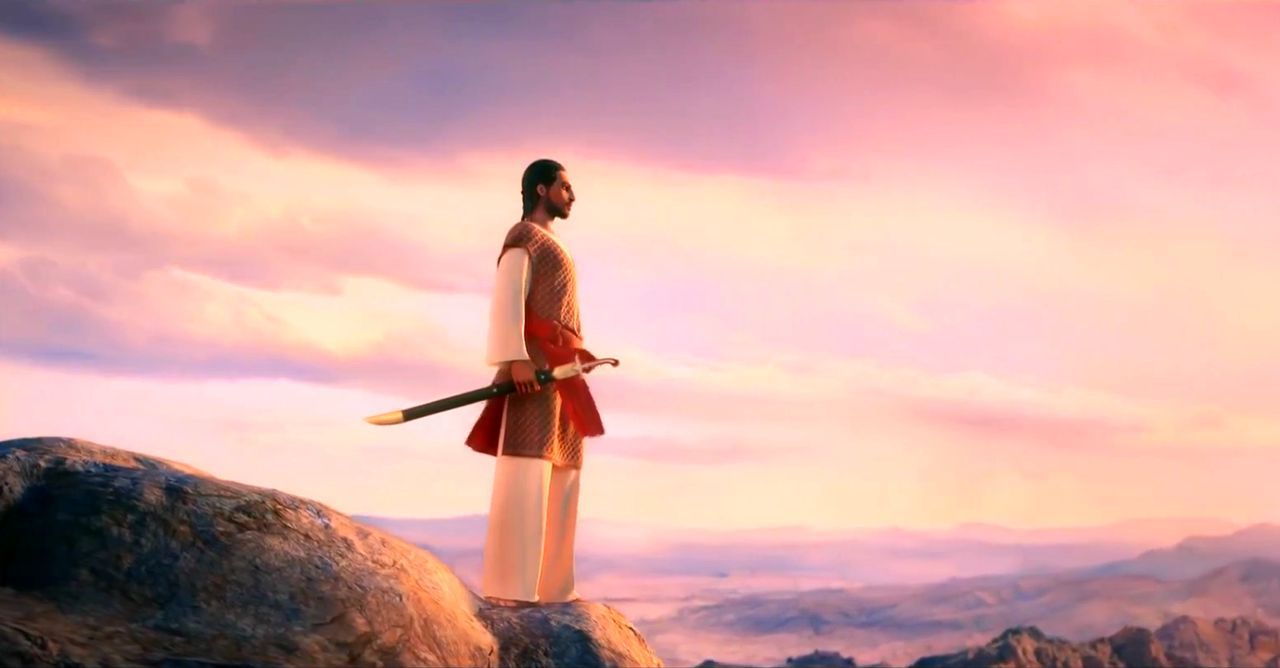MOVIE REVIEW: Bilal: A New Breed of Hero
BILAL: A NEW BREED OF HERO-- 2 STARS
Some causes and plights are universal to the heroism within the human condition no matter the era or culture. Comporting itself with admirable respect for the ennobling experience of its chosen history, Bilal: A New Breed of Hero portrays such heroism for film audiences. The debut animated feature film from the team of Khurram H. Alavi and Ayman Jamal presents common themes and intrepid messages within a folklore not often given a Western stage. Named the “Best Inspiring Film” on Animation Day at last year’s prestigious Cannes Film Festival, Bilal: A New Breed of Hero earns a great deal of that praise.
Set in the 7th century, Bilal: A New Breed of Hero loosely adapts the background story of Bilal ibn Ribah, the first muezzin of the Islamic faith, chosen by Muhammad himself. Before he became his people’s voice and symbol for the ritual routine of prayer, Bilal and his sister lived the hard life of slavery after being removed from their mother. For much of his life, Bilal (voiced as a teen by Jacob Lattimore and in adulthood by Adewale Akinnuoye-Agbaje) was owned by the richest trader of the Hejaz, the cruel Umayyah ibn Khalaf (Ian McShane). The societal norms of this time and place demanded appeasing idols with wealth and gifts, which granted tyrannical control to the rich like Khalaf.
Oppression and torture never loosened Bilal’s grasp of dreams of equality and becoming a warrior. Absorbing the teachings of Islam brought Bilal strength to endure, raising his courage and his character. Those qualities earned him his freedom and the tutelage of a famous fighter named Hamza (David B. Mitchell). Their push for insurrection to free more slaves also incurs the wrath of Khalaf and his equally harsh son Safwan (Mick Wingert), enough to climax to a battlefield clash with faith and independence in the balance.
Free of animal sidekicks and any silly comedy, Bilal: A New Breed of Hero is soberingly direct with its intentions as a staunchly PG-13 animated history lesson. Tucked away in the Middle East for over two years, this film yearns to be taken seriously and wears its “inspired by a true story” label quite proudly. For an animated effort made mostly by feature film rookies and new businesspeople cracking into showbiz, Bilal: A New Breed of Hero boasts mildly laudable production values.
The conservatively bloodless beef and brawn is led by a brassy and percussive score from composer Atli Orvarsson (NBC’s Chicago universe shows) and powered by the cinematography team of Ajdin Durakovic and Nareg Kalenderian. The camera artists borrow from the Zack Snyder paint palette of shot selection, slow-motion fight choreography, and wild camera play. Reminiscent of Robert Zemeckis’ early performance capture flicks, the CGI animation, headed by visual effect supervisor Oliver Arnold and CG supervisor Belal Salem, is a little bland in textures and wincingly lifeless with the human expressions, particularly in the empty eyes and mismatched mouths. Distractive flaws, including some casting choices, are evident and numerous.
Technical shortcomings aside, the influential and tangible messages emanating from the screen story conceived by Ayman Jamal are ever-present, comprising the top strength of the picture. There is compelling dedication to commend for this humanistic effort. However, the lags in Bilal: A New Breed of Hero come when the informative and soulful journey is sidetracked by the showy tendencies to still want to be an action film as well, hurting its overall engagement.
Pacing is a challenge especially when the worthwhile story stops short of going further into Bilal ibn Ribah’s historical muezzin role. It’s as if someone suspiciously interrupted the concept meeting and said “Hey, we can’t go full Muslim in here and show ethnic people praying to American audiences.” That’s a shame because this legend, when done with more liberal honesty to embrace the power of song in faith, praise, and worship, could have been a true gate-opener and introduction example to others.
LESSON #1: THE UNIVERSAL VALUES OF HUMAN HEROISM-- To circle back to the introduction, this film celebrates universal virtues. As true then as it is now with the Universal Declaration of Human Rights, equality, freedom, and humanity are three of many values that all the world’s people deserve regardless of any misused demographic label.
LESSON #2: THE TRAITS OF A GREAT WARRIOR-- From an early age on, the positive influencers of Bilal’s life, from his mother all the way to Hamza, extolled the virtues of being a warrior beyond the ability to fight. Heart, morality, and a temperance to not be controlled by anger are all found to be equally important in a great warrior’s makeup.
LESSON #3: NO ONE CAN OWN YOUR SOUL-- Echoing these words of Bilal’s mother, Bilal: A New Breed of Hero emphasizes remembering and preserving the freedom of the human spirit. The narrative positions Bilal to fight for that level of vitality and fervor through the visible and invisible chains of indentured servitude and despotic control.
LOGO DESIGNED BY MEENTS ILLUSTRATED (#647)



